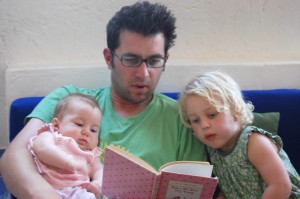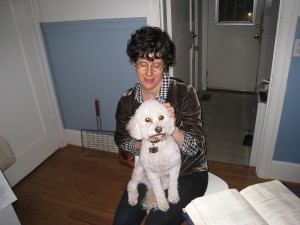Our Occupations (after the Occupations): Thomas Glass and Levin
BY Thom Donovan


Dan Thomas Glass and Lauren Levin are next up in a series of posts for National Poetry Month regarding how writing and art practices have changed in response to the occupations. Previous respondents include Stephen Collis and Steve Benson; Richard Owens and Brian Whitener; Brian Ang and Ana Božičević; David Buuck; and Suzanne Stein and Anna Vitale. The following two paragraphs contain part of the prompt that I provided to participants:
Something I am wondering about kind of broadly is how your practices might have changed since the beginning of the occupations, if we can mark this beginning in the fall of 2011 (the occupations obviously having their immediate precedent in the Middle East and Europe).
Do you think it may be possible to speak to this a bit? […] Succinctly, in a paragraph or two? Maybe it has had no perceivable effect, which is fine of course, and in which case you might talk about why it is important to maintain what you are doing parallel to (or beyond?) current social movements and political events.
DAN THOMAS GLASS
In the weeks leading up our second daughter Alma’s birth, as Occupy Oakland & my wife Kate bloomed & opened, I went to Oscar Grant Plaza twice. Once I took Sonia, my older daughter, nearly three then. I was impressed by the spontaneous reorganization of life taking place in the plaza—an opening of things that had been closed, it seemed. I was scared for Sonia there. I recognized this fear as ideologically determined—dramatically so—that the space of the plaza was outside the bounds of the safely guarded limits of my day-to-day life. Such a range of people, & a willingness to talk to one another across the boundaries of differences. But I was still scared for Sonia—I didn’t feel comfortable letting her roam in the ways that she would have liked. I didn’t let her cross boundaries. I kept her close. I felt a kind of shame at this discomfort, though I knew I had good reason for it. I still do. A shame that blooms & opens. But when I went back I didn’t bring Sonia. & I never went near OO when arrest was a remote possibility. I couldn’t cross those boundaries. I felt shame about this, & also pride & fear for those who did—who went & linked arms & got beat & arrested & put their bodies in harm’s way.
After Alma’s birth I spent a long time being amazed at how different time felt. All the time with bodies in our arms, bodies needing us! A new kind of all the time. In new ways, negotiating the two little bodies together as they orbited each other & us, touching them when I wake up or get home from work to reassure myself that time is material, that they are living. And then also this awareness, coterminous, all the time, of other bodies putting their bodies in the service of the needs of bodies from across boundaries. Watching these bodies on grainy internet streams, in words on feeds, while feeding Alma or Sonia, in the streaming that hours become in the fracturing of diurnal rhythms.
Like Suzanne Stein, I have become quieter. "I’m slower to know or judge how I think or feel, I’m tenderer and more cautious with myself and with others than I was before." Dana Ward wrote a poem that I’ve read since Fall 2011 called "Aeolian Phone," a poem that I love about objects and touching and bodies and connection, and near the end it says:
When I button my shirt I feel the armor my warm life has given to me in a serious variety of forms when I speak against the war against everything weak I have an everlasting thought about thought so I write this shit right here it used to be the hottest hip hop website in the world & now it's just the fucking internet period deformed by the rainbow that’s surging through its surface like the wind waking each thing to its peril I had a lyrical thought about tornadoes and it was a rhapsode the structure of which had a look of salacious efficiency which gave me to a mortifying thought about my writing so I sutured the harp of my phone to my mouth to try to speak Aeolian thoughts against going on like this I button my lips until the wind collects itself into a suffocating prism refracting the light into a rainbow that swallows the world & then it pukes & then the world is there again like a rainbow & I know what’s over it not Oz but the genie in Rimbaud or not that though truly the internet talks to me softly sometimes/it says that it loves me too much/it doesn’t have anything I want to steal/well/nothing I can touch
I am not in any fray, but I am streaming & feeding & blooming & opening & trying hard to be honest. I am in the armor of my warm life, but I am trying to touch what streams & talks to me softly by loving too much the things I can touch.
LAUREN LEVIN
It's tough trying to sum up the effect of the Occupations on my work (writing and living) - this still feels like a time for reflecting and consolidating (and maybe, soon, returning). Maybe it's easiest to sum it up by saying that the Occupations made a lot visible to me - or palpable in a more visceral way.
First, the wave of action, its sweep through my friends and my community, reminded that things could be otherwise. That there are openings to other worlds and other frameworks. I was listening to Nina Simone sing "Mississippi Goddam" yesterday ("Can't you see it / Can't you feel it / it's all in the air") and she says "This is a show tune / But the show hasn't been written for it, yet." That we are always in the process of writing this show, there's that.
What I also saw: the weight of repression when we try to be otherwise. A weight that's external (the police state) and internal (I've been thinking a lot about fear). Because to date I've been spared the worst forms of precarity - I have a job, health insurance, my debt is so-far manageable - the awful fact of how things are can seem like a bland surface to me. I slide over it. Its horrors are distant from me, and produce more low-grade anxiety than active feeling. But since the violent and destructive state response to the Occupations I've felt something I couldn't unfeel, and I perceive that bland surface differently, roiling with repressive energy.
Directly in my work, I've been trying to continue the opening to thinking, feeling, and seeing, against my constant tendency to settle into what's comfortable. I work on my discomfort with a (somewhat paranoid) lyric scanning of myself for points of collision with the world...and looking for traces of the ideologies I've been trained in, that naturalize injustice and make it feel inevitable.
I'm also working on a project trying to consider the prison system, from the point of view of absence. That millions of people are being vanished from their communities. Vanished into a racist and dismissive discourse that robs them of full humanity: i.e. that violence against prisoners somehow isn't violence, and doesn't count in the crime rate. As a pretty anxious person (have I mentioned anxiety yet?) I know that my own cravings for security are used to build this awful edifice. That I'm allowed and tempted to look away. So trying to write about that, too
Finally, realizing how myopic my vision tends to be, the Occupations have made me want to work more collaboratively, to try to extend my range and give myself an opportunity for the learning I so need. I've been working on critical essays about writers who I think succeed in prefiguring other systems, other worlds, to try to understand how they do it. This feels like collaborating, in a reader-to-writer way, with their ideas.
I worked with an amazing group of women on trying to build a Debt Play from survey results. And I'm helping out visual artist Cassie Thornton with her long-term project to interrogate security and securitization. (In that role, I get to be a proud, card-carrying member of the Feminist Economics Department.)
Often I feel like with this work I'm just struggling to get to the surface of myself at all - to the larger forums of action, the could-be-otherwise, to where I could join up with others. I wish I were further along. But hopefully reading and articulating confusion is worth something, at least for demystification.
Thom Donovan lives in New York City where he edits Wild Horses of Fire weblog (whof.blogspot.com) and...
Read Full Biography

